|
|
|
Sort Order |
|
|
|
Items / Page
|
|
|
|
|
|
|
| Srl | Item |
| 1 |
ID:
153097


|
|
|
| 2 |
ID:
153095
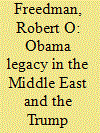

|
|
|
|
|
| Summary/Abstract |
During the second term of President Barack Obama, US-Israeli relations sharply deteriorated. After a positive visit by President Obama to Israel in March 2013, major disagreements erupted over the Israeli-Palestinian peace process, over the nuclear deal with Iran and, especially, over the construction of Jewish settlements in the Israeli-occupied West Bank. Making matters worse, personal recriminations crept into the Israeli-American dialogue on the disputes. While the two countries signed a major military assistance agreement in September 2016, Israeli settlement expansion after the election of Donald Trump as the US President in November 2016 led to a further deterioration of relations between the Obama Administration and Israeli Prime Minister Binyamin Netanyahu, which was demonstrated by the Obama Administration’s failure to veto a UN Security Council Resolution condemning Israeli settlements.
|
|
|
|
|
|
|
|
|
|
|
|
|
|
|
|
| 3 |
ID:
153093
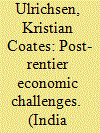

|
|
|
|
|
| Summary/Abstract |
The rentier states of the Middle East face a combination of political and economic challenges as they seek to reduce their reliance on volatile oil and gas revenues and diversify their economies. This article examines how the political economy of the six Gulf Cooperation Council (GCC) states remains heavily dependent on the hydrocarbon sector and analyses the policy responses to the fall in world oil prices since 2014. Sections in the article examine the definitional aspect of rentier state theory, nature of the redistributive welfare state that developed in the 1970s in each Gulf State, and the political aspect of economic measures that seek to reform aspects of the distinctive political economy that has underpinned socio-political and economic stability for the past five decades.
|
|
|
|
|
|
|
|
|
|
|
|
|
|
|
|
| 4 |
ID:
153096
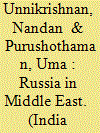

|
|
|
|
|
| Summary/Abstract |
Russia has re-emerged as a major player in the Middle East once again, mainly because of its military intervention in the Syrian civil war in September 2015. This article throws light on Russia’s civilizational links with the region and what its aims in the region have been over the years, including the during Cold War. While Russia’s foreign policy towards the Middle East was passive in the tumultuous years following the fall of the Soviet Union, over the last few years, it has begun reorienting and recalibrating its policy towards the region. This article discusses Russia’s current aims in the region and its global ambitions, linking these to its intervention in the Syrian civil war, paying particular attention to the close ties that Russia has with Syria. This article attempts to explore whether Russia’s presence in the region is sustainable. It also explains the consequences of Russia’s intervention for the region and for Russia itself.
|
|
|
|
|
|
|
|
|
|
|
|
|
|
|
|
| 5 |
ID:
153091


|
|
|
|
|
| Summary/Abstract |
Syria’s sudden plunge into civil struggle is directly linked with United States’ Middle East policy. The 2011 pull-out of American troops from the smouldering provinces of Iraq and the subsequent refusal of the US to take sides in the ‘Arab Spring’ have weakened the incumbent governments and produced too many unsuitable civil claimants to rule ‘Arab Spring’-affected countries. The so-called US neutrality left a vacuum, which was filled by a swarm of Islamist extremists. The resultant internecine wars sparked by contending parties in Iraq, Syria and Yemen had taken these countries to the very verge of chaos. The outcome among other things included a revival of al-Qaeda, which was soon eclipsed by Islamic State in Iraq and Syria (ISIS), and an unending spiral of civil war in Syria, the major result of the anti-Western blowback. This article argues that the fight against extremist forces in Syria is doomed if there is absence of a strong, functional and acceptable government. Lasting peace under President Bashar al-Assad looks impossible but it is essential to have the core of Ba’athist regime in place in any transitional or post-transition mechanism. A new interpretation of political solution is required. Else, the state will collapse, which will only help the jihadists. Despite its limitations and challenges, federalisation of Syria and the establishment of a federal structure of the government, it seems, is the only viable solution.
|
|
|
|
|
|
|
|
|
|
|
|
|
|
|
|
| 6 |
ID:
153092
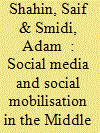

|
|
|
|
|
| Summary/Abstract |
The role of the media, and especially the social media, in the Arab Spring has been extensively debated in academia. This study presents a survey of studies published in scholarly journals on the subject since 2011. We find that the bulk of the research contends that social media enabled or facilitated the protests by providing voice to people in societies with mostly government-controlled legacy media; helping people connect, mobilise and organise demonstrations; and broadcasting protests to the world at large and gaining global support. Some scholars, however, argue that social media played only a limited or secondary role, which ought to be viewed alongside other social, political, economic and historical factors. We also identify the spatial and temporal focus of the research and preferred theoretical and methodological approaches and draw attention to several blind spots that require further investigation.
|
|
|
|
|
|
|
|
|
|
|
|
|
|
|
|
| 7 |
ID:
153090
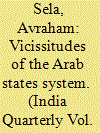

|
|
|
|
|
| Summary/Abstract |
This article analyzes the historical performance of the Arab states system—incarnated in the form of the League of Arab States (AL)—from the latter’s foundation in 1945 through its heydays in the late 1970s during which it left a long-term imprint in the form of new norms and rules governing the inter-Arab game, to the more recent state of weakness and marginalization, especially in the wake of the Arab Spring. Contrary to the commonly held views by Western scholars of the AL as an inherent failure, this article sheds light on the impact made by this system via the AL, especially in affecting interstate security and order in a region saturated with conflicts.
|
|
|
|
|
|
|
|
|
|
|
|
|
|
|
|
| 8 |
ID:
153094


|
|
|
|
|
| Summary/Abstract |
The article aims to explore the securitisation of water in the Nile basin. As in the wider Middle East, the securitisation of water occurred in the context of larger political grievances, inherited from colonial times. The trigger in all cases has been water scarcity. The securitising actors in all cases were decision-makers; in the case of the Tigris–Euphrates basin, NGOs and human rights activists have also emerged as securitising actors. The target audiences in all cases included the national public and international public opinion, as well as decision-makers in donor countries, especially in the case of the Tigris–Euphrates and Nile basins. Several securitisation mechanisms have been used simultaneously in all cases; in the case of the West Bank Aquifer, for example, resource capture (structural securitisation) went hand in hand with joint water management committees (institutional securitisation). In all cases, language played a crucial role in the securitisation of water resources, especially in the cases of Egypt and Israel, where the symbolic value of water and land are closely tied with religious traditions inherited from ancient times.
|
|
|
|
|
|
|
|
|
|
|
|
|
|
|
|
|
|
|
|
|